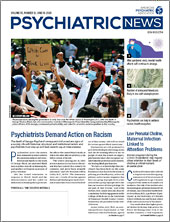Children of women infected with a respiratory virus during pregnancies scored lower on tests of self-regulation at age 3 months compared with children of uninfected mothers—but only if the mothers also had inadequate prenatal plasma levels of choline, said researchers led by Robert Freedman, M.D., a professor of psychiatry at the University of Colorado School of Medicine and former editor of the American Journal of Psychiatry.
“Our results show that higher prenatal choline levels may help protect the fetus’s developing brain even if the mother contracts a viral respiratory infection in early pregnancy,” wrote Freedman and his team in the Journal of Psychiatric Research, published online May 25.
“It is troublesome that only one-third of women [in the original study] had adequate levels of choline, and this must have public health implications,” he said in an interview.
“This is a really important study because it shows how an early indicator can influence later behavior,” commented Alan Brown, M.D., M.P.H., a professor of psychiatry and epidemiology at Columbia University, who has studied the influence of upper respiratory infection on risk of developing schizophrenia. Brown’s research has led him to suggest that some psychiatric problems can arise from a “double hit,” as in this case, when prenatal infection combines with a second insult like lower choline levels.
Among other roles in the developing fetus, choline affects cell membrane solidity, has a positive effect on the metabolism of folic acid, and protects neurons by reducing inflammation, he said.
Nationally, about 90% to 95% of pregnant women consume inadequate amounts of choline, according to the National Institutes of Health. In 2017, that reality led the AMA to formally support the presence of “evidence-based amounts of choline in all prenatal vitamins,” said Freedman.
The current report is based on research completed in 2016. However, its conclusions may suggest that maintaining proper choline levels could reduce risk to children of women going through pregnancy during the COVID-19 pandemic.
“The CDC predicts that COVID-19 will impact fetal brain development like other common corona respiratory viruses,” said Freedman. That may mean that use of choline supplementation may lessen some effects of the virus on their infants.
Freedman and colleagues included a subset of 96 women from a previous study. Between weeks 6 and 16 of pregnancy, 43 of the women had contacted a respiratory viral infection with fever and 53 mothers who had not.
Infants were assessed at age 3 months using the Infant Behavior Questionnaire-Revised Short Form (IBQ-R). Choline levels made a significant difference on one critical measure of infant development, said Freedman. “Infants of mothers who contracted viral infections and had choline levels ≥7.5 μM had significantly increased three-month IBQ-R scores on the Regulation dimension and specifically the Attention scale in the Regulation dimension, compared with infants of mothers who had viral infections and had choline levels <7.5 μM.”
Although mothers with respiratory viral infections were younger and more likely to be depressed and anxious than women who did not get sick, those conditions were not connected with the primary outcome measure, said the researchers.
The effects on the fetus were caused not by the specific infective agent itself, but rather by the mother’s inflammatory response to it. The start of the second trimester is a critical time for formation of inhibitory interneurons, when they are especially vulnerable to inflammation. These inhibitory interneurons are involved in the infant’s development of attention and self-regulation.
“We do know that infection in pregnancy can affect the fetus and brain development,” said Sarah Mulkey, M.D., Ph.D., an assistant professor of pediatrics and neurology at George Washington University School of Medicine and Health Sciences and Children’s National Hospital in Washington, D.C. Mulkey was not involved with Freedman’s study but has studied the neurodevelopment effects of the Zika virus. “At this time, it is too early to know if maternal COVID infection in pregnancy will have any neurodevelopmental effects to infants, but we are in the process of evaluating this. It is a very important question.”
The Colorado researchers have continued to follow the children in the original study. Results have not yet been published, but current data suggest that the effects noted at three months have persisted, said Freedman. More recently, they began a new, double-blind, placebo-controlled study testing choline supplementation in 30 pregnant women. However, when one-third of the women contracted COVID-19, ethical reasons dictated that all infected mothers should be given clinical doses of choline. The trial’s goal also was changed to test the effects of different choline levels rather that supplementation alone. Results will not be known for another three or four years, said Freedman.
Would administering choline supplements to children born to mothers infected in pregnancy improve their outcomes?
For several reasons, postnatal supplements are unlikely to confer any additional benefit, said Freedman. “The cholinergic receptor for choline drops dramatically at birth, acetylcholine from the midbrain neurons replaces choline as the agonist at the cholinergic receptor and it is 1,000 times more potent, and attempts to supplement adults with choline to improve neuronal function have not worked.”
The COVID-19 pandemic is now so widespread that many pregnant women will be exposed to the coronavirus and thus provide an unfortunate opportunity to see if earlier findings on infection can be replicated, said Brown.
“There is so much about the virus that we don’t know,” said Brown. “If it crosses the placenta and affects the fetal brain, it might mirror the findings of rubella, where we saw very high risks of schizophrenia. Or we could see a strong maternal response that produces effects similar to those of influenza.”
The study was supported by the National Institute of Child Health and Human Development, the National Center for Advancing Translational Sciences, the Institute for Children’s Mental Disorders, and the Anschutz Foundation. ■
“Maternal Choline and Respiratory Coronavirus Effects on Fetal Brain Development” is posted
here.
